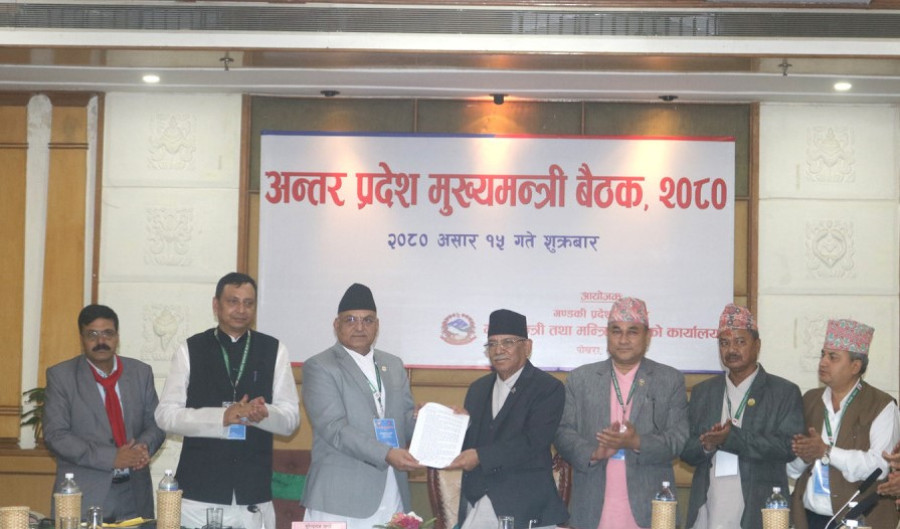Columns
So the chiefs can powwow
Establishing a chief ministers’ forum will be a big step towards strengthening federalism.
Khim Lal Devkota
Nepal's new constitution was promulgated in 2015 and the implementation of federalism began after the 2017 elections. Years have passed since then, but the provinces, which are synonymous with federalism, have not been able to make their presence felt.
The political parties are responsible for this, but the federal government bears an even greater responsibility. The constitution has given the provinces the authority to administer the provincial police force and ensure peace and security. But this is still a farfetched reality for them.
In terms of fiscal federalism, the provinces have been undermined and undervalued. The grants allocated to the provinces in the fiscal 2023-24 budget have decreased by Rs20 billion from the previous year. The provinces also have to share the revenue rights with the local governments. To bridge the gap between revenue rights and functional responsibilities, the constitution has arranged fiscal transfers. On this score too, the provinces have been deceived.
The provinces seem to be concerned about attracting the displeasure of the prime minister or other political party leaders when it comes to asserting their rights. In contrast, the local governments are well organised and have their own associations to demand what is theirs.
It is essential that the chief ministers of the provinces establish organised platforms to assert their rights.
International experience
In South Africa, the law allows the premiers of two or more provinces to establish an inter-provincial forum with the purpose of promoting and facilitating intergovernmental relations between those provinces. The composition, role and functioning of such an inter-provincial forum are to be determined through an agreement between the participating provinces. The law also specifies the responsibilities and functions of these inter-provincial forums.
The United States is the world's oldest federal country. In 1908, the governors of the states established an organisation known as the National Governors Association. This association serves as a platform for governors to collaborate, share information and address common issues impacting their states. Throughout the years, the association has played a crucial role in promoting cooperation among governors and influencing national policy discussions. It serves as a significant liaison between the state governments and the federal government in matters of public policy.
In 2003, the Canadian provinces established the Council of the Federation with the aim of providing a platform for premiers to share information, exchange ideas and collaborate on various issues, including healthcare, economic development, trade and inter-provincial relations.
In Switzerland, the constitution states, "The Cantons may enter into agreements with each other and establish common organisations and institutions. They may collaborate on regional tasks of significance." It is important to note that the agreements between the cantons must adhere to the law, align with the interests of the Swiss Confederation, and respect the rights of other cantons.
The Conference of Cantonal Governments in Switzerland formed in 2003 serves as a forum for the cantons to coordinate their efforts. The Conference of Federal State Prime Ministers is a committee formed in 1948 by the 16 states of Germany to coordinate policies in areas falling under their exclusive jurisdiction.
The conference convenes four times a year, and the chairmanship of the meetings rotates annually among the federal states according to a predetermined schedule. This rotation ensures equitable representation and participation among the states in the decision-making process.
The Council for the Australian Federation was established in 2006. It serves as a platform for state and territory leaders to discuss and address significant issues independently of the Commonwealth of Australia. Inspired by Canada's Council of the Federation, the council aims to shape the national policy agenda strategically and facilitate political actions. All state and territory premiers or chief ministers are members of the council. In 2023, the council conducted a review of its operations and reaffirmed its objectives, which include fostering a common understanding among the states and territories regarding policy matters involving the federal government.
Regional issues
India does not have a separate chief ministers forum, but the Indian constitution contains a provision for an Inter-State Council. However, it was activated only in 1990. Like in Nepal's Inter-Province Council, the prime minister of India chairs the Inter-State Council. In addition, the Indian states are organised into five regional councils. These regional councils play a positive role in settling most regional issues.
Based on the experiences of other federal countries, establishing a chief ministers' forum or a similar organisation in Nepal could be a valuable step towards enhancing inter-provincial cooperation, strengthening federalism, fostering overall development, and serving as a platform to advocate for the rights of the provinces. Such a forum would provide a platform for collaboration, coordination and policy dialogue among the chief ministers, contributing to effective governance, efficient resource management, and improved service delivery across the provinces.




 8.22°C Kathmandu
8.22°C Kathmandu















